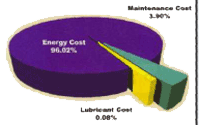 Industry in general is still to wake up to the full energy saving potential of enhanced lubricant technology, perhaps because energy saving synthetic lubricants are perceived as expensive, compared to traditional mineral oils. Justification for increased expenditure on lubricants can be difficult, as lubricants are often viewed as a maintenance cost, while energy is seen as an operating cost.
Industry in general is still to wake up to the full energy saving potential of enhanced lubricant technology, perhaps because energy saving synthetic lubricants are perceived as expensive, compared to traditional mineral oils. Justification for increased expenditure on lubricants can be difficult, as lubricants are often viewed as a maintenance cost, while energy is seen as an operating cost.
A recent study at a leading food manufacturer by Fuchs Lubricants, illustrates the savings that synthetic oils can offer. Energy consumption was reduced by more than 5% in hydraulic systems and bearings, > 5% in spur gears and >30% in worm gears. Trials of new synthetic lubricants on a single 100HP rotary compressor, operating on full load over three shifts, resulted in savings of
Once parameters are determined, a suitable schedule for oil changes needs to be agreed, either regular maintenance periods or intervals recommended by the monitoring system. Following the oil change, measurements of power consumption and working temperatures can be taken again and savings calculated. Fuchs also recommends extending oil change periods for the synthetic oil, in order to maximise the oil life and prevent unecessary maintenance.
As efficiency increases, machinery will generate more output from a given amount of energy, or create a derived output from less energEither way, the relationship between energy bills and production improves.
There is no exact figure that can be predicted for the total cost savings available to manufacturers by changing to energy efficeint lubricants. Each company's unique circumstances will determine their return and immediate justification for the higher cost of the oil can be difficult, because maintenance savings cannot be shown prior to purchasing it. Measuring energy savings, using methods such as those described, provides a more immediate and definitive means of justifying the use of such performance-formulated lubricants.
Lubricant costs are minimal in comparison with energy costs and energy savings, resulting from inproved lubrication, create the opportunity to reduce maintenance costs and improve plant reliability and profitability. Even a small percentage of reduction in enrgy consumption can translate into large returns and give payback on the lubricant within a few months. The total cost benefit of using synthetics doesn't stop at utility bills. Other factors, such as lubricant usage, maintenance periods, waste levels and manpower must also be included in the equation.
Synthetic oils also offer other benefits, including reduced deposits and cleaner machinery, extended equipment life, due to advanced corrosion protection and longer oil life, from higher temperature stability. They can be used for long drain periods, because they resist thermal and oxidative breakdown better at higher temperatures, preserving the basestock and prolonging the active life of additives.
To help businesses realise the potential cost savings avilable, Fuchs UK has published a free guide, "Energy Saving Lubricants for Process Industries"


